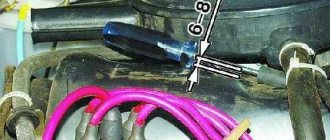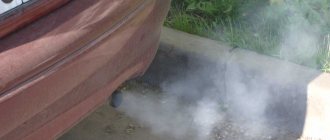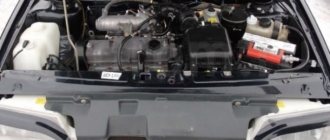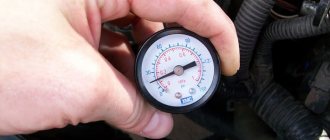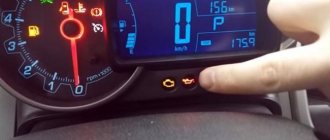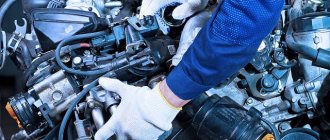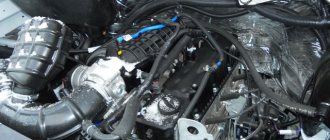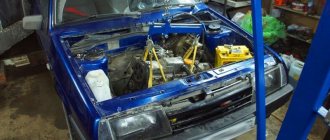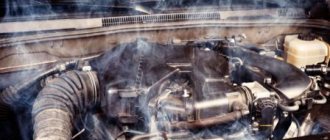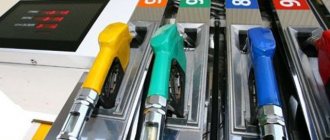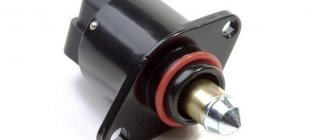How to prevent a malfunction?
When the mixture of fuel and air burns unevenly, a characteristic sound appears, caused by pressure from the vibration of the cylinder walls during combustion. The height of this sound wave depends on the parameters and shape of the combustion chamber. If you operate the motor in this mode for even a few seconds, you can cause damage to internal parts.
The occurrence of this phenomenon should alert car owners, especially if it is repeated frequently. It is necessary to immediately identify the causes of engine detonation and seriously address them.
avtoexperts.ru
Drivers of the old school, who began their driving journey 15-20 years ago or earlier, hardly need to be told what detonation is. They absorbed this information literally from the first lessons of the driving school, and it was one of the points of proper driving and car maintenance. Everyone memorized the characteristic sound of detonation, which was popularly called “knock of fingers,” literally from the first kilometers. However, novice motorists who have only recently joined the ranks of drivers may not be aware of this phenomenon at all. Modern cars have at least learned to deal with detonation, and it has ceased to be so common. But this is the danger - detonation itself, as a physical phenomenon, has not gone away in modern engines; when it occurs, it still causes severe harm to the engine, especially when the driver does not know what it is and how to deal with it.
What is detonation?
In scientific terms, detonation is the random spontaneous ignition of a mixture in the engine cylinders, which has the character of an explosive wave. It is the last parameter that distinguishes detonation from other cases of spontaneous combustion of the mixture in cylinders (for example, glow ignition). The main problem of detonation is not that the fuel-air mixture ignited at the wrong time, but that the speed of spread of this fire is 500-1000 times greater than in the case of a conventional “ignition” from a spark plug. It is the shock wave that leads to all the negative consequences of detonation.
To make it clear what kind of misfortune we are talking about, we will list the negative aspects that detonation has on the engine.
1. All motor elements are overloaded, which significantly reduces their service life. The pistons and crankshaft are especially .
2. Due to rising temperatures, the risk of burning out valves and head gaskets increases.
3. The detonation wave washes away the oil film from the cylinder walls, which can lead to scoring .
By the way, the characteristic sound when detonation occurs is not the knocking of fingers, as is commonly believed, but the impact of the blast wave from detonation on the cylinder walls. If the engine fingers were so worn out that they made such sounds, then the owner of this engine would have to think not about detonation, but about overhaul.
Causes of detonation
It is clear that detonation is primarily self-ignition. But why does the mixture spontaneously ignite at all? Under ideal conditions this does not happen, but as soon as several additional factors appear, the thermal operation of the engine is disrupted. And then immediately expect detonation.
Consequences of engine detonation
It is clear that no motor can withstand such conditions for a long time. Even the most durable. Detonation has a particularly detrimental effect on modern lightweight engines made of aluminum alloys. In principle, this malfunction does not bode well for cast iron units either.
The main negative consequences of detonation of a VAZ engine or any other brand:
In particularly severe cases, the crank mechanism rotates and the crankshaft begins to rotate in the opposite direction. This leads to destruction of engine components.
Engine oil additive "Suprotek Active Plus"
Restores compression, reduces fuel consumption and oil waste, reduces wear rate and extends the life of internal combustion engines of any type. Facilitates cold starts and protects against overheating in traffic jams.
Engine detonation - causes, solutions
Modern cars are equipped with four-stroke gasoline and diesel engines, which were developed at the end of the 19th century; despite significant progress in the automotive industry, they have not undergone fundamental changes since then. The main disadvantage of power plants is considered to be low efficiency, and, of course, engine detonation causes a lot of trouble. The detonation process is a spontaneous ignition of the air-fuel mixture, reminiscent of a strong explosion in nature, moreover, this phenomenon occurs before the moment required during the operating cycle. As a result of parallel processes, the pressure in the cylinder increases, overheating occurs inside the combustion chamber, and a metallic knock appears.
What is engine detonation
In some cases, the air-fuel mixture ignites before the spark plugs produce a spark. This phenomenon, accompanied by shock combustion of fuel, is engine detonation. The enormous rate of fuel combustion is associated with the ignition of the entire volume simultaneously, and not sequentially from a spark. In addition, ignition begins earlier than the calculated crankshaft angle, when the piston is still moving towards top dead center (TDC). The ignited gases rapidly expand, but the rising piston tends to compress them. As a result, the pressure in the combustion chamber is many times higher than the calculated value.
Additive Suprotek Active Gasoline for a new gasoline engine
Additive for gasoline and gas engines with mileage up to 50,000 km. Can be used for forced and turbocharged engines.
Causes of the detonation process
Detonation can occur both on a hot and cold engine, appearing under heavy load, during sharp acceleration, less often at idle, but quite often after turning off the ignition. Explosive combustion of fuel in cylinders occurs for various reasons, which are difficult to list all at once, but it is worth considering the main ones, and these are:
- low-quality fuel or fuel that does not meet the octane number, for example, the car is filled with ninety-second gasoline instead of AI-95;
- the formation of soot, due to which the volume of the combustion chambers decreases, the compression ratio increases, as a result, thermal conductivity decreases, and overheating occurs;
- spark plugs that are incorrectly selected according to the heat rating, detonation also occurs if the spark plugs are coked, do not produce normal sparking, and generally require replacement;
- the ignition angle is too early, which increases the pressure in the cylinders and, accordingly, the temperature;
- incorrectly adjusted valves (clamped);
- lean air-fuel mixture, the process occurs due to the fact that the lean composition burns slowly, and afterburning no longer occurs from the spark plug, but in a chaotic manner;
- engine overheating at idle;
- Incorrect flashing of the engine control unit.
Also, the engine can detonate due to design features (malfunctions characteristic of a specific internal combustion engine model), as a result of improperly carried out repairs. Let’s say that while performing repair work, the master decided to mill the surface of the block head, thereby reducing the combustion chambers; as a result, the octane number of gasoline no longer corresponds to the new, already increased compression ratio.
Consequences of detonation
As mentioned above, the consequences of detonation in a car engine are very serious, and under no circumstances should repair work be delayed, because the longer you drive with this phenomenon, the more damage the engine and its individual elements are susceptible to. So, the consequences of detonation include:
- Cylinder head gasket combustion . The material from which it is made (even the most modern ones) is not designed to work under conditions of elevated temperature and elevated pressure that arise during the detonation process. Therefore, it will fail very quickly. A broken cylinder head gasket will lead to other problems.
- Accelerated wear of elements of the cylinder-piston group . This applies to all its elements. And if the engine is no longer new or has not undergone a major overhaul for a long time, then this can end very badly, up to its complete failure.
- Cylinder head breakdown . This case is one of the most difficult and dangerous, but if you drive for a long time with detonation, then its implementation is quite possible.
- Burnout of piston/pistons . In particular, its bottom, lower part. However, it is often impossible to repair it and will only need to be completely replaced.
- Destruction of jumpers between rings . Under the influence of high temperatures and pressure, they can be one of the first to break down among other engine parts.
- Connecting rod bend . Here, similarly, in conditions of an explosion, its body can change its shape.
- Burning valve plates . This process occurs very quickly and has unpleasant consequences. As can be seen from the list, the consequences of the detonation process are the most serious, therefore the engine should not be allowed to operate under its conditions; accordingly, repairs must be performed as quickly as possible.
The meaning of the knock sensor in the electronic engine system
There were practically no electronics on carburetor internal combustion engines, so it was difficult to combat detonation processes, and the ignition angle was adjusted manually. Knock sensors began to be used with the advent of injectors, and later DD appeared on diesel engines equipped with electronic control. The operating principle of this device is that, by monitoring the level of explosive ignition, it transmits a corresponding signal to the electronic control unit, and the ECU, according to the data received, automatically adjusts the ignition angle, making it much later.
Even if strong detonation occurs, flexible adjustment allows you to soften the detonation knock as much as possible, reducing it to almost nothing. True, in this case the dynamics are also lost, the car begins to “stupid” during acceleration, but global destruction of the piston group, cylinders and combustion chambers does not occur. The DD is almost always located on the cylinder block of the internal combustion engine, at the point of the highest heating; it is a piezoelectric element that captures all noise and knocking, converting mechanical energy into an electrical signal.
Detonation during acceleration
Now we need to consider how to determine detonation on an engine and the signs of its manifestation. When this process occurs, a chaotic, ringing metallic knock occurs, hence the expression “knock fingers” common among motorists (meaning piston pins, another stable expression is “rattling valves”). When accelerating the car, a knocking noise can be clearly noticeable when you sharply press the gas pedal, and the greater the load, the more clearly the detonation of the engine can be heard. In general, in practice there are not many reasons why a clattering noise appears in the engine when the load increases, and the main ones are:
- refueling a car with low-octane gasoline or low-quality fuel;
- deposition of a large amount of carbon deposits in the combustion chambers (coke often forms on the piston heads as a result of increased oil consumption);
- overheating, there are many different factors that influence the increased temperature of the internal combustion engine;
- incorrect ECU system, mainly associated with failures in the program, errors during flashing.
Also, the sound of detonation appears if the engine brake fails; in this case, the ignition adjustment no longer occurs during sudden acceleration. The configuration of the electronic unit may be incorrect; for example, the flashing was carried out in the cold season without taking into account temperature changes in the weather, so in the heat the possibility of detonation occurring on a warm engine is quite likely.
Engine detonation when turned off
Drivers and car owners often confuse the appearance of detonation on a cold engine with vibration or unstable operation of the internal combustion engine; nevertheless, explosive ignition of the air-fuel mixture mainly occurs due to excessive pressure in the cylinders at elevated temperatures, and this is not always associated with engine tuning. The reason for unstable engine operation, especially at idle, may be:
- torn engine or gearbox mounts;
- malfunction of air flow sensors or idle air control;
- unregulated (clamped) valves;
- lean mixture;
- missing spark on the spark plugs;
- piercing high-voltage wires;
- faulty ignition module.
Another fairly common phenomenon is engine detonation after turning off the ignition, this manifests itself as follows:
- the fuel does not ignite with a spark, but the crankshaft continues to rotate jerkily at different frequencies;
- the duration of such a cycle can be from 2-3 to 20-30 seconds;
- The crankshaft may almost stop completely, but then the chaotic rotation cannot be ruled out again.
Self-detonation occurs due to very strong overheating of the engine, it is most typical for carburetor internal combustion engines; a similar phenomenon is also called “dieseling”. On injectors, a process of this kind occurs much less frequently, mainly due to the failure of the motor, in hot weather, when starting the engine in cold conditions, detonation does not occur, the temperature inside the cylinders is too low. Other reasons for dieseling are increased carbon formation in the cylinders, installation of spark plugs with a low heat rating on a highly accelerated engine. Therefore, to eliminate such a defect in some situations, it is enough to simply change the spark plugs; it is recommended that the selection of parts be carried out in accordance with the manufacturers’ recommendations; special selection tables have been developed for this purpose.
Main causes of engine detonation
Detonation processes in internal combustion engines can be caused by:
Detonation occurs not only in spark-ignition engines, but also in diesel engines.
The reason is incorrect adjustment of the timing of diesel injection and the use of low-quality fuel.
Diesel has a reduced thermal regime, but under increased load and a faulty cooling system, hot elements (for example, the edges of exhaust valves) can prematurely ignite atomized fuel.
Wrong choice of fuel for a car
Engines with a compression ratio of more than 10 units and supercharged units are designed for fuel with an octane rating of at least 95. When using low-grade gasoline or evaporating additives (used by some oil refining companies to increase detonation resistance), premature ignition of the explosive mixture occurs. The injection engine controller is able to reduce the likelihood of detonation by adjusting the ignition timing and valve timing (if there is a camshaft rotation system).
Features of engine operation
Detonation occurs when the engine is overloaded (for example, while driving at low speed on a long climb in high gear). To eliminate the defect, it is necessary to switch to a lower speed, which will increase the rotation speed and normalize the combustion process.
Detonation of a car engine when starting a cold power unit indicates a lean mixture due to clogged injector nozzles. As it warms up, the problem disappears (the performance of the injection system corresponds to the required composition of the air-fuel mixture).
Incorrectly configured ignition
Firmware
Detonation can be caused by incorrect firmware installed in the engine control unit (for example, after removing the catalytic converter, owners load a program with a modified operating algorithm). If problems are detected, it is necessary to install firmware that matches the characteristics of the power unit. Spontaneous changes to the specified settings during engine operation are impossible.
Faulty spark plugs
When choosing spark plugs, it is necessary to take into account not only the dimensions of the threaded bushing, but also the heat rating (information on tolerances is indicated in the service instructions and specialized catalogs). The use of products with a reduced or increased number leads to difficult starting and disruption of the spark formation process. The engine loses power and torque, normal fuel combustion is disrupted and the car's acceleration dynamics drop.
Lean air/fuel mixture
Owners of cars with a carburetor strive to reduce gasoline consumption by leaning the fuel mixture, which leads to incorrect combustion. Electronically controlled technology automatically maintains the stoichiometric composition of the mixture, focusing on information from temperature, air flow or oxygen concentration sensors in the exhaust gases (located before and after the catalytic converter housing). If the catalyst breaks down or the sensors fail, the working mixture may become depleted, causing detonation processes during combustion.
Carbon deposits on the cylinder walls
The carbon deposits formed on the walls of the working chamber and the exhaust valve plates worsen the cooling conditions of the parts. During the compression process, the mixture of air and fuel ignites before the permissible moment, which leads to detonation combustion. The problem often occurs on power units with high mileage; engine oil enters the combustion chambers and forms a layer of dense carbon deposits.
ICE design features
Passenger car engines with a compression ratio of 10 or more are prone to detonation when using gasoline with an octane rating of less than 95. Some engines have sharp edges on the pistons and surfaces of the combustion chambers, which disrupt the normal combustion process. In this case, the problem is solved by using high-quality fuel, but short-term detonation remains during transient operating conditions.
Power units with increased liter power (for example, with a supercharger) are characterized by increased pressure of the working mixture at the inlet to the cylinder. When using low-quality fuel or violating cooling conditions, the risk of detonation increases.
The design includes a sensor that detects the moment the explosive combustion of the fuel mixture begins and regulates the operation of the systems (for example, it reduces the pressure in the boost system using a special valve in the turbine or adjusts the ignition timing).
Detonation of gas and diesel engines
There is a belief that there is no detonation process in engines running on propane-butane or methane, but this is a completely erroneous opinion. Quite often, diesel leakage occurs on cars that use gas as fuel; the phenomenon is mainly due to the following factors:
- the gas reducer is not adjusted (lean mixture);
- ignition is delayed;
- coke formed in the combustion chambers;
- Spark plugs with a low heat rating are installed.
Most often, detonation here appears when the engine is turned off on gas, and on gasoline it is often completely absent. If there is no detonation on gasoline fuel, but there is detonation on gas, most likely, you need to deal with the settings of the gas system, which also significantly affects the operation of the gas engine spark plugs, because a more powerful spark is required to ignite gas fuel.
There is no detonation of a diesel engine in the usual sense: in diesel engines, the air-fuel mixture is not ignited by a spark, the energy is converted into movement, and not into heat, which means the temperature inside the cylinders is lower. But a diesel internal combustion engine can work “hard” due to an incorrectly set fuel injection angle, poor combustion of diesel fuel, and the combined mixture; such work is similar to detonation. On modern cars, a knock sensor is installed on diesel engines with an electronic high-pressure fuel pump; it adjusts the injection angle, and if the engine fails or there is a break in the wires, the engine starts to knock and the speed increases.
Why does detonation occur in engine cylinders?
Experts identify several main reasons why fuel detonates in the engine.
- First of all, it is worth immediately highlighting the use of low-octane gasoline in units with a high compression ratio. Simply put, the octane number of gasoline (AI-92, 95 or 98) actually indicates its resistance to detonation, and not its quality, as many people mistakenly believe.
The use of fuel with an inappropriate octane number for a particular engine naturally leads to the fact that the fuel-air charge detonates under strong compression. Let us also add that simple engines that do not have an ECM and a knock sensor are at greater risk.
- Engine coking. It is important to understand that modern engines not only in foreign cars, but also in domestic cars are very different from their analogues from the times of the USSR. In a nutshell, if the engines on the Moskvich 2141 model had a compression ratio of about 7 units and worked normally on any fuel, today the units have from 9 to 11 or more units.
- Violation of the mixture formation process. In this case, a too “rich” mixture, in which there is a lot of fuel in relation to the amount of air, may begin to detonate.
Note that such detonation can be short-term and often goes unnoticed by the driver, however, it is impossible to say that there is no harm to the engine.
- Ignition timing (IDA). In simple words, the ignition angle determines at what point the spark will be supplied to the combustion chamber. If we consider that normally fuel does not explode, but burns, then it becomes clear that the combustion process also takes some time.
In this case, it is important to ensure that the maximum gas pressure on the piston, which is formed as a result of the combustion of a portion of fuel, occurs precisely at the moment of the working stroke of the piston. This is the only way to effectively transfer the energy of the expanding gases through the piston to the crankshaft.
To do this, the spark can be applied a little earlier than the moment the piston reaches top dead center (TDC). During this time, the fuel will have time to ignite, and the expansion of gases and an increase in pressure on the piston will occur just at the moment when the piston has already reached TDC and then goes down.
- Design features of the combustion chamber. It happens that some engines are initially prone to detonation. In some cases, the reason is the design of the combustion chamber itself, the implementation of its cooling, etc.
How to eliminate detonation on a gasoline engine
To avoid detonation on a gasoline internal combustion engine, the following rules should be followed:
- fill the fuel tank with gasoline recommended by the manufacturer, refuel at proven gas stations;
- prevent engine overheating, monitor the temperature in the cooling system using the sensor on the instrument panel;
- if oil consumption increases, repair the piston group; if the consumption is relatively small, as an option you can try to decarbonize the engine;
- Install spark plugs with the appropriate heat rating.
If the Check Engine light comes on on the dashboard and the engine detonates, computer diagnostics must be performed. The most common errors associated with a malfunction of the sensor or its circuit:
- P0327 – weak signal;
- P0328 – high signal level;
- P0325 and P0326 – damage to the DD electrical circuit.
How to eliminate finger knocking in hot weather is a question that worries many drivers, especially if detonation does not occur at normal ambient temperatures. Perhaps the most reasonable solution in this case is to refuel the car with fuel with a higher octane number, because if you fill the tank with AI-95 gasoline instead of AI-92, it will definitely not make things worse, but detonation knocks will disappear. Much depends on the quality of the fuel, so it is better to refuel at a gas station with a good reputation.
